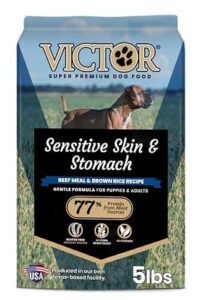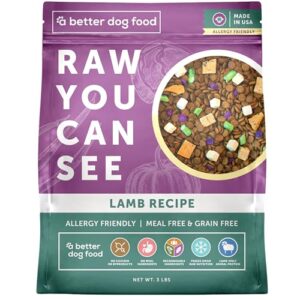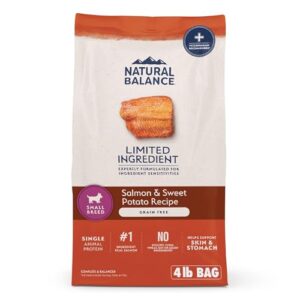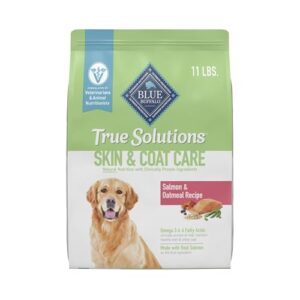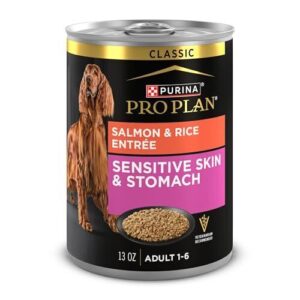This site is supported by our readers. We may earn a commission, at no cost to you, if you purchase through links.

Your dog’s persistent scratching might not be fleas—chicken protein ranks among the most common food allergens in canines, affecting an estimated 15-20% of dogs with food sensitivities. The protein your dog has eaten safely for years can suddenly trigger an immune response, leading to inflamed skin, chronic ear infections, and digestive distress that conventional treatments can’t resolve.
What makes chicken allergy particularly tricky is how ubiquitous poultry ingredients are in commercial dog food, hiding under names like “poultry meal,” “animal fat,” or “natural flavoring.” Finding truly chicken-free dog food requires more than scanning the front label—cross-contamination in manufacturing facilities means even products marketed as poultry-free may contain trace amounts.
The right dietary switch can transform your dog’s health within weeks, but you’ll need to know which formulas deliver on their promises and which protein alternatives work best for allergic dogs.
Table Of Contents
- Key Takeaways
- What is Chicken Allergy in Dogs?
- Common Symptoms of Chicken Allergy
- Diagnosing Chicken Allergy in Dogs
- Risks of Undeclared Chicken in Dog Food
- Ingredients to Avoid in Chicken Allergy Dog Food
- Best Protein Alternatives for Allergic Dogs
- Top 5 Chicken-Free Dog Foods Reviewed
- Transitioning to Chicken-Free Dog Food
- Managing Chicken Allergy Symptoms
- Tips for Living With a Chicken-Allergic Dog
- Frequently Asked Questions (FAQs)
- What should I Feed my dog if he has chicken allergies?
- What foods are safe to eat with milk allergy?
- Can dogs be allergic to chicken?
- What is a good food for dogs with allergies?
- What is the best dog food for dogs allergic to chicken?
- How can you tell if your dog is allergic to chicken?
- What is the best protein for dogs with chicken allergies?
- Can my dog eat turkey if he’s allergic to chicken?
- How can I prevent accidental chicken exposure?
- Are there hypoallergenic treats for dogs with allergies?
- Conclusion
Key Takeaways
- Chicken protein affects 15-20% of dogs with food sensitivities, and the allergy can develop suddenly even after years of safe consumption, triggering immune responses that manifest as inflamed skin, chronic ear infections, and digestive distress that standard treatments can’t resolve.
- True chicken-free dog food requires scrutinizing labels beyond the front panel since chicken hides under names like “poultry meal,” “animal fat,” or “natural flavoring,” and cross-contamination in manufacturing facilities means even products marketed as poultry-free may contain trace amounts that trigger reactions.
- Diagnosis demands an 8-12 week elimination diet with a single novel protein and carbohydrate, followed by careful reintroduction testing, because standard allergy tests for dogs remain unreliable and symptoms can overlap with sensitivities that stem from digestive issues rather than immune responses.
- Effective protein alternatives include novel sources your dog hasn’t eaten before (lamb, venison, duck, salmon) or hydrolyzed protein diets that break proteins into peptides too small for the immune system to recognize, with clinical studies showing 70-80% symptom improvement within 8 weeks of switching.
What is Chicken Allergy in Dogs?
A chicken allergy in dogs happens when your dog’s immune system mistakenly identifies chicken protein as a threat and launches an attack against it. This immune response triggers inflammation throughout your dog’s body, leading to uncomfortable symptoms that can affect their skin, digestive system, and overall wellbeing.
A chicken allergy occurs when your dog’s immune system mistakes chicken protein for a threat, triggering widespread inflammation and discomfort
Understanding what causes this reaction, how it develops, and the difference between a true allergy and simple sensitivity will help you protect your dog’s health.
Causes and Prevalence of Chicken Allergy
Your dog’s immune system can mistakenly identify chicken proteins as threats, triggering IgE-mediated reactions and canine allergies. Genetic predisposition plays a role—certain breeds show higher susceptibility to poultry allergy symptoms. Cooking methods may alter protein structure, increasing allergenicity.
While food allergy symptoms affect just 1.8% to 2.5% of dogs, chicken allergy ranks among the most common triggers, creating diagnostic challenges that require careful allergen exposure tracking. Understanding scientific study summaries is essential for identifying the root causes of these allergies.
How Chicken Allergies Develop in Dogs
Genetic predisposition sets the stage, but sensitization pathways unfold through repeated exposure. Your dog’s immune system reaction shifts toward a type 2 inflammatory profile after initial contact with chicken proteins.
Environmental factors like compromised skin barriers allow dietary triggers to penetrate, while gut microbiome changes exacerbate canine hypersensitivity.
This immune response transforms routine meals into allergens, explaining why chicken allergy emerges unexpectedly in previously tolerant dogs.
Chicken Allergy Vs. Sensitivity
Understanding the distinction matters for treatment options. A true chicken allergy triggers an immune response with measurable IgE antibodies—your dog’s system declares war on chicken proteins. Sensitivity signs like bloating or loose stools stem from digestive enzyme imbalances, not immunologic pathways.
Diagnostic challenges arise because allergy testing in dogs remains unreliable. Both conditions demand chicken-free novel ingredient dog food or hypoallergenic dog food formulations for effective management.
Common Symptoms of Chicken Allergy
Recognizing a chicken allergy in your dog isn’t always straightforward. The symptoms can show up in different ways, affecting your dog’s skin, digestion, and overall behavior. Here’s what you need to watch for.
Skin Issues and Itching
If your dog’s scratching more than usual, chicken protein allergy could be the culprit driving that relentless itch. Pruritus causes linked to food-immune responses often show up as:
- Red, inflamed paws from constant licking (pododermatitis)
- Hair loss on belly and groin (bilateral alopecia)
- Ear infections with odor and discharge
- Secondary skin infections worsening dermatitis management
- Persistent scratching despite flea control
Itch relief starts with identifying dietary triggers through allergy testing and elimination trials.
Digestive Problems and Gastrointestinal Upset
A churning stomach tells its own story. Gastrointestinal upset from dog food allergies often triggers vomiting, diarrhea, or mucus-filled stool within hours of eating chicken. This inflammatory response disrupts intestinal balance and gut health, leaving your dog uncomfortable. Unlike food intolerance, true allergies provoke immune reactions that damage the gut lining. Dietary reactions vary—some dogs show acute stomach issues, others develop chronic problems that complicate digestive health and canine nutrition.
| Symptom | Allergy Pattern |
|---|---|
| Vomiting episodes | Acute, post-exposure |
| Diarrhea/soft stool | Hours to days after |
| Mucus in stool | Mucosal inflammation |
| Chronic GI signs | Delayed hypersensitivity |
Ear and Skin Infections
Persistent scratching and head shaking signal a deeper problem. Chicken allergy triggers otitis externa—recurrent ear infections with redness, discharge, and foul odor—while skin lesions invite secondary bacterial or yeast overgrowth.
You’ll notice:
- Malassezia pachydermatis thriving in inflamed ear canals
- Staphylococcus causing pyoderma and interdigital cysts
- Mixed infections complicating topical therapies
Addressing the dietary trigger stops the cycle of infection control failures plaguing your dog’s skin health.
Behavioral and Weight Changes
Often overlooked, behavioral shifts and appetite changes betray your dog’s discomfort long before skin flares. Weight fluctuations—loss from digestive upset or gain from reduced activity—accompany irritability, lethargy, and food aversion. Sleep disruption intensifies as itching worsens nightly.
| Behavioral Shifts | Appetite Changes | Weight Fluctuations |
|---|---|---|
| Increased irritability | Decreased food intake | Progressive weight loss |
| Reduced activity levels | Food aversion develops | Fluctuating body condition |
| Anxiety and restlessness | Nausea-driven avoidance | Stabilizes post-elimination |
| Sleep disruption | Metabolic demands shift | Requires monitoring |
Addressing chicken allergy through hypoallergenic dog food options normalizes these patterns, restoring your dog’s vitality and stable weight.
Diagnosing Chicken Allergy in Dogs
You can’t just guess your way to a chicken allergy diagnosis—it takes a methodical approach and your vet’s expertise. The primary method is an elimination diet, but your veterinarian will also need to rule out other conditions that mimic food allergies.
Here’s what you need to know about the diagnostic process and when to seek professional help.
Elimination Diet Process
An elimination diet strips your dog’s meals down to the basics—one novel protein and one carbohydrate—for 8–12 weeks to pinpoint food allergies. During this dietary trial and error, you’ll maintain strict dietary restrictions, avoid all chicken sources, and monitor symptom tracking closely.
- Feed only permitted ingredients: No treats, table scraps, or supplements containing poultry.
- Document every change: Track skin condition, stool quality, and itching daily.
- Reintroduce gradually: Test one protein at a time after symptoms resolve, ensuring nutrient balance throughout.
Veterinary Consultation and Workup
Your vet starts with a thorough history and physical exam, looking for signs of dog allergies and ruling out other culprits. They’ll likely run baseline blood work, urinalysis, and skin cytology to catch secondary infections common with allergic reactions.
This veterinary diagnosis sets the stage for elimination trials and dietary planning—guided by veterinary guidance and support—so you can map out effective allergy treatment options and move forward confidently.
Risks of Undeclared Chicken in Dog Food
Even dog foods labeled as chicken-free can contain traces of chicken due to manufacturing practices and inadequate regulatory oversight. A 2022 study revealed that undeclared chicken appeared in numerous commercial pet foods, putting allergic dogs at risk despite careful label reading.
Understanding these hidden dangers helps you make safer choices and protect your dog from unexpected allergic reactions.
Cross-Contamination in Manufacturing
Even “chicken-free” dog foods can harbor hidden poultry proteins through cross-contamination during production. Manufacturing facilities often process multiple formulas on shared equipment, creating supply chain and production safety risks.
Your best defense? Choose brands with dedicated lines, rigorous contamination testing, and stringent quality control protocols—especially vital for limited ingredient diets designed to manage food allergies in sensitive dogs.
Regulatory Issues and Study Findings
Here’s the problem: regulatory oversight in the U.S. pet food industry relies heavily on guidance rather than strict enforcement. The FDA and AAFCO set standards, but compliance varies by state, leaving gaps in labeling accuracy and manufacturing standards.
Recent studies spotlighting undeclared chicken in hypoallergenic formulas reveal:
- Cross contamination affects up to 20% of tested products
- Novel protein diets aren’t always chicken-free
- Allergen-specific immunotherapy depends on accurate ingredient disclosure
- Food allergies in dogs demand transparent sourcing
- Third-party testing remains your best verification tool
Ingredients to Avoid in Chicken Allergy Dog Food
Reading dog food labels isn’t always enough when your dog has a chicken allergy. Chicken ingredients hide in unexpected places, from “poultry fat” to “natural flavors,” and even treats and supplements can contain traces you won’t see listed.
Let’s break down the hidden sources you need to watch for and how to keep poultry completely out of your dog’s diet.
Identifying Hidden Chicken Sources
Chicken contamination lurks where you least expect it. Many dog foods labeled “beef” or “lamb” contain chicken fat or poultry byproducts—hidden ingredients masked under vague terms like “natural flavors.” Manufacturing risks include cross-contact during production, and supplier transparency varies widely. Food labeling laws don’t always require disclosure, making novel protein diets tricky.
Here’s what to watch for:
| Label Term | Hidden Chicken Risk | Why It Matters |
|---|---|---|
| Natural flavors | May derive from poultry | Triggers chicken allergy reactions |
| Chicken meal/byproducts | Often grouped vaguely | Worsens food allergies |
| “Beef flavor” products | Can contain chicken fat | Sabotages chicken-free dog food goals |
Avoiding Poultry in Treats and Supplements
Your dog’s main meals aren’t the only threat. Treats and supplements sneak poultry derivatives past even careful pet parents. Jerky strips contain chicken fat, dental chews hide poultry proteins, and omega oils use chicken-derived carriers—all triggering food allergies.
Watch for these hidden risks in PoultryFree options:
- Flavor enhancers labeled “natural chicken flavor” in non-meat treats
- Supplements with chicken broth or hydrolyzed poultry proteins
- Cross contamination from shared manufacturing lines processing chicken
- Third-party chews lacking allergen testing or certification
- “ChickenFree” claims without independent verification standards
Always verify ingredient panels before purchase.
Best Protein Alternatives for Allergic Dogs
Once you’ve eliminated chicken from your dog’s diet, you’ll need to find a protein source that won’t trigger the same immune response. The best alternatives fall into three main categories: novel proteins your dog hasn’t eaten before, fish-based options rich in omega-3s, and specially processed hydrolyzed proteins.
Let’s look at each option so you can choose what works best for your dog’s specific needs.
Novel Protein Sources (Lamb, Venison, Duck)
When your dog can’t tolerate chicken, novel protein sources like lamb, venison, and duck become your go-to allies. These proteins work because your dog’s immune system hasn’t encountered them before, reducing protein sensitivity risks.
Lamb nutrition offers essential amino acids, venison benefits include low-fat profiles, and duck allergy rates remain minimal. Pair these poultry free options with grain free formulas for a complete hypoallergenic diet targeting dog food allergies.
Fish-Based Dog Food Options
Salmon and trout lead the pack as fish recipes for your chicken-allergic dog, offering omega-rich foods that calm inflamed skin while delivering novel protein. You’ll find grain-free options and poultry-free dog food options that pair fish with limited ingredients, creating a true hypoallergenic diet.
Fish oil benefits extend beyond allergen avoidance—they actively support your dog’s recovery from chronic reactions.
Benefits of Hydrolyzed Proteins
Hydrolyzed protein diets split whole proteins into tiny peptides your dog’s immune response won’t recognize as chicken. You’re feeding essential amino acids without triggering food allergies—a major advance for dogs with chicken allergies.
- Protein breakdown creates peptides too small for allergic reactions
- Digestive health improves as hydrolyzed formulas reduce GI upset
- Clinical studies show 70-80% symptom improvement within 8 weeks
- Peptide size determines safety; smaller fragments mean better tolerance
- Dog food allergies become manageable through controlled amino acid delivery
Top 5 Chicken-Free Dog Foods Reviewed
You’ve done the hard work of identifying your dog’s chicken allergy—now it’s time to find a food that actually works.
The five brands below have been selected based on ingredient transparency, protein quality, and manufacturer reliability. Each option uses a different primary protein source, so you can choose what fits your dog’s specific needs and your budget.
1. Victor Sensitive Skin Dog Food
Looking for relief from your dog’s constant scratching? Victor Sensitive Skin Dog Food delivers beef meal as its first ingredient—completely chicken-free—while targeting skin allergies head-on.
You’ll get grain-inclusive nutrition with brown rice and millet, which works differently than grain-free dog food options.
The formula packs omega-3, omega-6, and vitamin E specifically for dog skin health and allergies. Victor ingredients include prebiotics and probiotics supporting sensitive skin from the inside out.
It’s designed for dog nutrition that tackles food allergens without sacrificing pet wellness or protein quality.
| Best For | Dogs with sensitive skin, food allergies, or digestive issues who need a high-protein, chicken-free formula that supports skin health and immune function. |
|---|---|
| Primary Protein | Beef |
| Form | Pellet |
| Age Range | All Life Stages |
| Skin Support | Yes |
| Grain-Free | No |
| Made in USA | Not specified |
| Additional Features |
|
- Beef meal as the first ingredient provides high-quality animal protein without chicken, making it ideal for dogs with poultry allergies
- Omega-3, omega-6, and vitamin E work together to improve coat shine and reduce itching and scratching
- Prebiotics and probiotics support gut health, which often helps with both digestion and skin problems from the inside out
- Higher price point compared to standard dog foods due to specialized ingredients and novel protein sourcing
- Some owners report an unpleasant kibble smell that may be off-putting
- May require an 8-12 week transition period to see full results, and hidden chicken derivatives can occasionally appear despite chicken-free labeling
2. A Better Treat Lamb Dog Food
Want single-source protein without the chicken worry? A Better Treat Lamb Dog Food puts lamb front and center at $24.99, targeting pet allergies with zero chicken, no meals, and grain-free kibble.
You’ll find freeze-dried raw pieces boosting lamb nutrition alongside probiotics for allergy management. Dog food reviews highlight sensitive skin improvements and digestive support, making dietary transitions smoother for hypoallergenic diet needs.
The formula tackles dog food and allergies through recognizable ingredients, though some owners report fewer freeze-dried pieces than expected. It’s solid chicken allergy protection with pet nutrition tips built in.
| Best For | Dogs with chicken allergies or sensitivities who need a single-source protein option with digestive support and skin-soothing benefits. |
|---|---|
| Primary Protein | Lamb |
| Form | Pellet |
| Age Range | All Ages |
| Skin Support | Yes |
| Grain-Free | Yes |
| Made in USA | Yes |
| Additional Features |
|
- Lamb as the only animal protein source with no chicken, grains, or meal ingredients for clear allergen avoidance
- Freeze-dried raw pieces and probiotics support digestion and help with sensitive stomachs
- Made in the USA with recognizable ingredients at an affordable $24.99 price point
- Some users report fewer freeze-dried raw pieces in the bag than expected
- May require gradual transition to avoid GI upset when switching foods
- Effectiveness varies by individual dog, and lamb allergies, though rare, are still possible
3. Natural Balance Salmon Dog Food
Need a grain-inclusive option that still skips chicken? Natural Balance Salmon Dog Food delivers salmon benefits with rice-based carbs, targeting food sensitivities through limited ingredients and novel proteins at a wallet-friendly price point.
You’re getting dog food for sensitive skin with omega-rich fats supporting coat health—a smart hypoallergenic diet move for chicken allergy management. While it’s not strictly grain-free dog food, the formulation tackles dog food and allergies through controlled ingredient exposure.
Regional availability varies, so check your local retailers for this clinically-oriented option.
| Best For | Dogs with chicken allergies or sensitivities who need a salmon-based formula with grains included for balanced nutrition. |
|---|---|
| Primary Protein | Salmon |
| Form | Pellet |
| Age Range | Small Breed |
| Skin Support | Yes |
| Grain-Free | Yes |
| Made in USA | Not specified |
| Additional Features |
|
- Salmon as the main protein provides omega-rich support for skin and coat health
- Limited ingredient approach helps identify and avoid trigger foods
- More affordable than many grain-free alternatives while still addressing sensitivities
- Bag lacks a resealable closure, which can impact freshness over time
- Some dogs may still react since it’s not a strict elimination diet
- Strong fish smell isn’t everyone’s favorite during feeding time
4. Blue Buffalo Skin And Coat Care
Blue Buffalo’s Skin and Coat Care relies on real salmon as the first ingredient, targeting skin health and coat care with omega-3 and omega-6 fatty acids. However, most formulations include chicken, so if you’re managing a chicken allergy, verify the ingredient panel carefully.
Some varieties incorporate novel proteins like fish, making them viable as best dog food for allergies and skin allergies support. The omega supplements boost dermal barrier function, though it’s not strictly grain-free dog food.
For confirmed sensitivities, scrutinize labeling for hidden poultry sources before committing to this option.
| Best For | Dogs with skin and coat issues who aren’t allergic to chicken, or owners looking for omega-rich food to support dermal health and coat shine. |
|---|---|
| Primary Protein | Salmon |
| Form | Dry |
| Age Range | Adult |
| Skin Support | Yes |
| Grain-Free | No |
| Made in USA | Yes |
| Additional Features |
|
- Real salmon as the first ingredient delivers high-quality protein and natural omega fatty acids for skin barrier support.
- Formulated by vets and nutritionists with added vitamins like zinc and E to target coat appearance and reduce itching.
- No corn, wheat, soy, or poultry by-product meals, making it cleaner than many budget options.
- Most formulations contain chicken, so it’s not suitable for dogs with poultry allergies despite the salmon focus.
- Pricier than standard dog foods, and some users report quality control issues like torn bags.
- Results vary by dog—some see major improvements while others notice little change in skin or coat condition.
5. Purina Pro Plan Sensitive Skin Dog Food
Purina Pro Plan Sensitive Skin offers real salmon and rice for digestible pet nutrition and health, but here’s the catch: many formulations list chicken in the ingredient panel. If you’re managing a confirmed chicken allergy, this creates real risk. Cross-reactivity with poultry by-products can trigger skin allergies and digestive upset, even when chicken isn’t the primary protein.
Always verify the exact formula you’re purchasing. For true chicken-free assurance, you’ll need to scrutinize every label or pivot to a hydrolyzed or fish-only variant within the Pro Plan line.
| Best For | Dogs with sensitive skin and stomachs who can tolerate chicken by-products, or owners willing to carefully verify chicken-free formula variants. |
|---|---|
| Primary Protein | Salmon |
| Form | Pate |
| Age Range | Adult |
| Skin Support | Yes |
| Grain-Free | No |
| Made in USA | Not specified |
| Additional Features |
|
- Real salmon and digestible rice provide gentle nutrition with prebiotic fiber for gut health and omega fatty acids for skin and coat
- High protein formula supports lean muscle with 23 essential vitamins and minerals for complete adult dog nutrition
- Can reduce itching, biting, and ear infections when the right formula matches your dog’s specific sensitivities
- Many formulations include chicken or chicken by-products despite the salmon labeling, making it risky for dogs with confirmed chicken allergies
- Price point runs higher than standard dog food options, and some reviews mention quality control issues like bugs in cans
- Ingredient lists vary by region and pack size, requiring careful label verification at every purchase to avoid allergen exposure
Transitioning to Chicken-Free Dog Food
Switching your dog to a chicken-free diet isn’t something you should rush. A sudden change can trigger digestive upset, vomiting, or diarrhea—even if the new food is perfect for managing allergies.
Here’s how to make the shift safely while watching for any signs that something isn’t working.
Steps for a Safe Dietary Switch
Your dog’s shift to chicken-free food demands careful dietary planning and a gradual change over 7–10 days. Mix 25% of the novel proteins with current food initially, then increase by 25% every two days. This safe introduction minimizes food intolerance and GI upset while respecting dietary restrictions.
An elimination diet approach aids canine dietary management, helping you identify true allergen-friendly foods that work.
Monitoring for Adverse Reactions
Once you’ve made the switch, track your dog’s response closely. Watch for skin flares, scratching, or ear discharge within 2–6 weeks—these signal allergic reactions or food intolerance tied to the immune system.
Keep a food diary logging meals, treats, and allergy symptoms daily. This reaction tracking and symptom logging will reveal whether the new diet truly resolves your dog’s adverse response to chicken.
Managing Chicken Allergy Symptoms
Switching to a chicken-free diet is only half the battle—your dog may still need help managing the symptoms that have already taken hold. The good news is that you’ve got several tools at your disposal, from medications that calm the immune response to supplements that rebuild your dog’s skin and gut health.
Here’s what actually works when you’re dealing with active allergy symptoms.
Medications and Topical Treatments
When allergic flare-ups hit hard, your vet may recommend corticosteroid therapy like prednisone or topical sprays to dial down severe inflammation fast. Antihistamines offer gentler relief for mild reactions, while medications like Apoquel target itch at its source.
For long-term control, allergen-specific immunotherapy and pain management strategies complement dietary changes, giving your dog real comfort while you tackle the root cause.
Supplements for Skin and Digestive Health
Omega-3 fatty acid supplements calm inflammatory responses and fortify skin barriers, giving your dog relief from skin allergies.
Probiotics support gastrointestinal health by balancing gut bacteria, while zinc supplements and antioxidant support from vitamin E strengthen the immune system.
Digestive enzymes help dogs absorb nutrients better, addressing malabsorption issues. These targeted nutrients work alongside dietary changes to manage allergy symptoms effectively.
Long-Term Allergy Monitoring
Consistent health monitoring transforms how you manage your dog’s chicken allergy over time. Schedule dermatologic evaluations every 6–12 months to track skin changes and itch severity using standardized pruritus scales.
- Keep owner-reported diaries documenting flare frequency, triggers, and duration across 8–12 week intervals
- Request periodic blood work to assess evolving immune response markers and rule out comorbidities
- Consider controlled re-challenge tests to confirm persistent food allergies and guide dietary adjustments with allergenfriendly foods
Tips for Living With a Chicken-Allergic Dog
Managing a chicken allergy isn’t just about choosing the right food—it’s about building a lifestyle that keeps your dog safe from hidden exposures. You’ll need to stay vigilant about everything from treat ingredients to cross-contamination risks at home.
Here are three practical strategies to protect your chicken-allergic dog every day.
Preventing Accidental Exposure
Think of your kitchen as a no-fly zone for chicken. You’ll need dedicated safe storage areas with clear labeling systems to prevent cross contamination—color-code everything.
Create written emergency plans for household members, conduct regular supplier verification of ingredient lists, and maintain strict dietary management protocols.
These allergen-friendly foods practices protect your dog from accidental chicken allergy triggers and food allergy flare-ups.
Maintaining a Food Diary
You need a detailed record system to spot patterns between meals and reactions. Track feeding times, exact portion sizes, brand names, and every treat you give. Note when symptoms flare—itchy paws at 3 PM, loose stool after dinner—to map correlations between intake and onset.
This food tracking diary becomes your diagnostic roadmap, helping you and your vet distinguish true food allergy from food intolerance through systematic dietary analysis.
Working With Your Veterinarian
Your vet isn’t just a checkpoint—they’re your strategic partner in canine dietary management. Schedule a dedicated consultation to map out a veterinary guidance plan covering elimination protocols, diagnostic tools, and treatment planning. Bring your food diary, list previous reactions, and discuss allergy diagnosis options.
Ongoing monitoring through regular check-ups lets you adjust based on clinical response, ensuring your dog allergies management stays effective long-term.
Frequently Asked Questions (FAQs)
What should I Feed my dog if he has chicken allergies?
Your dog thrives on novel proteins like lamb, venison, duck, or salmon—alternatives that don’t cross-react with chicken.
Hydrolyzed protein diets and limited ingredient formulas also work well for confirmed chicken allergies.
What foods are safe to eat with milk allergy?
Dairy-free grains like oats, rice, and quinoa are safe choices. Plant-based milk alternatives such as almond or soy milk work well.
Always choose products labeled dairy-free to avoid hidden milk proteins.
Can dogs be allergic to chicken?
Yes, your dog can develop a true chicken allergy through IgE-mediated or non-IgE-mediated reactions. Poultry allergies emerge after repeated exposure, with cross-reactivity to turkey or duck possible in sensitive canines.
What is a good food for dogs with allergies?
The best dog food for allergies features novel proteins like venison or salmon, hydrolyzed formulas, or limited ingredients.
Hypoallergenic options and grain-free varieties help you pinpoint allergens through food trials, giving your pet real relief.
What is the best dog food for dogs allergic to chicken?
Novel proteins like lamb, venison, and duck offer excellent alternatives for poultry allergies.
Hydrolyzed protein diets and fish-based formulas provide safe, nutritionally complete options when you’re eliminating chicken from your dog’s diet.
How can you tell if your dog is allergic to chicken?
Food allergies account for 10% of canine allergies, but spotting them isn’t simple. Watch for persistent itching, ear infections, paw licking, vomiting, or diarrhea after meals—signs that warrant food trials and allergy testing.
What is the best protein for dogs with chicken allergies?
Lamb, venison, duck, and fish-based diets offer effective novel protein alternatives for chicken-allergic dogs.
Hydrolyzed protein formulas minimize immune reactions by breaking proteins into smaller, less recognizable peptides for severe cases.
Can my dog eat turkey if he’s allergic to chicken?
Turkey may trigger cross-reactivity since it shares proteins with chicken. You’ll need a veterinary-supervised food trial to test your dog’s immune response safely.
Monitor for itching or digestive upset during novel protein introduction.
How can I prevent accidental chicken exposure?
You’ll need strict kitchen sanitation and careful food storage to prevent cross contamination.
Always wash hands, separate utensils, and read labels thoroughly—accidental ingestion can trigger symptoms even from trace chicken exposure.
Are there hypoallergenic treats for dogs with allergies?
Yes—many brands offer grain-free, limited ingredient, or novel protein treats like duck or venison. Hydrolyzed protein diets provide hypoallergenic snacks too.
Always verify labels to avoid hidden chicken and cross-contamination from manufacturing facilities.
Conclusion
What if the solution to your dog’s chronic misery was hiding in plain sight on their food bowl? Switching to the right chicken allergy dog food isn’t just about eliminating an ingredient—it’s about reclaiming your dog’s comfort and vitality.
Armed with label-reading skills, vetted protein alternatives, and your veterinarian’s guidance, you now hold the blueprint for lasting relief. Your dog’s healthiest days don’t require complicated interventions, just informed choices that honor their unique biology.
- https://thefarmersdog.otegtm.net/c/2442109/1640964/9488
- https://www.dpbolvw.net/click-100788894-15827016
- https://freshpet.com/blog/ways-to-turn-around-a-picky-eater/
- https://www.merckvetmanual.com/integumentary-system/food-allergy/cutaneous-food-allergy-in-animals
- https://pubmed.ncbi.nlm.nih.gov/16527756/









